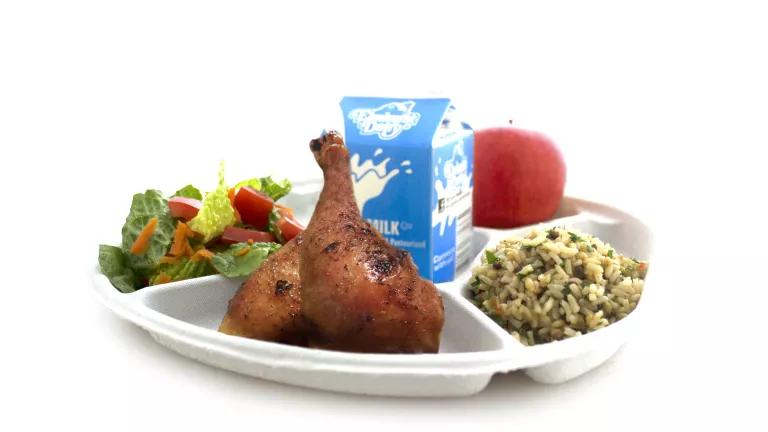
School food usually gets a bad rap.
But six of the largest school districts in the nation are once again trying to change that reputation.
Today, the Urban School Food Alliance - a unique coalition including New York City, Los Angeles, Miami, Orlando and Chicago--is announcing that its member cities will start rolling out the use of compostable round plates in school cafeterias this month.
The schools are saying good-bye to roughly 225 million polystyrene foam (commonly known as Styrofoam) trays per year - allowing these cities to dramatically slash waste sent to landfills, reduce plastics pollution in our communities and oceans, and create valuable compost that can be re-used on our farms.
My colleague Margaret Brown writes more about the importance of shifting away from polystyrene foam and towards compostable plate here.
By making this move these cities are also teaching kids that sustainability and smarter choices can be integrated into every part of your daily life - even your lunch.
Last December, the Alliance announced a landmark standard for antibiotic-free chicken to be served in their schools--helping to drive the incredible shift we've seen in the poultry industry over the past five months.
And in this exciting new announcement the Alliance cities have collaborated to develop an affordable environmentally friendly round plate to replace the standard - and dreaded -- polystyrene foam tray now used in school cafeterias across the country. The fully compostable plate is made at a mill in Waterville, Maine from recycled newsprint.
Historically, schools across America use polystyrene trays because they cost less than compostable ones. Polystyrene trays average about 4 cents apiece, compared to its compostable counterpart, which have averaged about 12 cents each. Given the extremely tight budgets in school meal programs, affording compostable plates for these cities seemed impossible until the Alliance districts used their collective purchasing power to innovate a compostable round plate for schools at an affordable cost of just under 5 cents.
Like their recent commitment to buy antibiotic-free chicken, the six cities are leveraging their $550 million per year collective purchasing to not only improve school food for the three million kids they serve each day, but also to change the national market for sustainable food purchasing - allowing other school districts and large buyers to switch to compostable plates.
What's being served up next? This spring, Alliance schools districts will work toward purchasing compostable cutlery and are expected to roll out the new utensils in schools during the 2015-16 school year. Compostable cutlery will replace institutional-looking plastic "sporks" (combination of spoon and fork in one) that students find cumbersome to use.
NRDC has been proud to partner with the Alliance over the last few years and assist them in their efforts to purchase healthier and more environmentally sustainable food and food service products.
Step by step, the Alliance is working hard to change the image - and reality - of school food.




